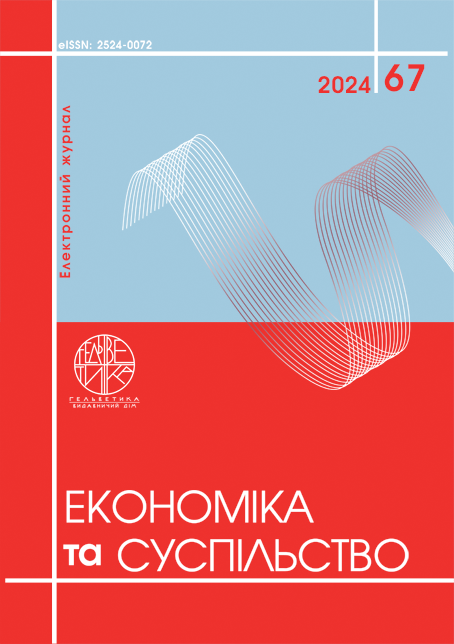BUSINESS INNOVATION MANAGEMENT IN DIGITAL CONTEXT
Abstract
The article deals with the peculiarities of managing business structures in a digital context. It is determined that with increasing demand on digital innovation scenario, it is important to supplement and improve the policy system for managing digital innovation. Innovation policy studies have gradually moved from focusing on "limiting policy to control negative consequences" to focusing on "constructive policy to expand positive consequences." It has been stated that digital transformation has led to a multidimensional and deep impact on innovation management, and theoretical research on policy frames for new areas of technology socialization effects should be accelerated. It is proposed, a political frame that covers three aspects: political needs in the sustainable transformation of digital innovations, policy orientations on policy for sustainable transformation of digital innovations, creation of opportunities of research work, optimization R&D, knowledge creation, application, joint promotion, standardization of management, national digital innovation system, digital innovative fund, data management potential, digital security and other aspects of the conceptual basis of the basic policy on a permanent transformation of digital innovation. In the conditions of formation of information society in different The sectors of the economy create and accumulate a lot of different data. In industry, business, the flow of information needed to manage the enterprise is steadily increasing. If in the past the most important factor of competitiveness and the creation of value for enterprises were the state of cost management and quality of products (services), today and in the future, along with the most physical product that gets increasingly value received from digital marketing and reasonable analytics. Rapid development of digital technologies, their implementation and application, on the one hand, is a serious challenge, on the other – new opportunities, powerful benefits for business. Undoubtedly, in time in Ukraine there is a large –scale digitalization of all sectors of the economy and basic spheres of life, increased investments in the development of digital infrastructure, innovation and modern technologies. Digital technologies reduce barriers to new markets, allow you to automate a huge amount of mechanical work, modernize equipment, optimize management and business processes.
References
Віденєєв О., Яворська Н. Управління інтелектуальним потенціалом бізнес-структур: підходи та концепції. Актуальні питання у сучасній науці, 2024. № 9 (27). С. 89–102. http://perspectives.pp.ua/index.php/sn/article/view/14802
Воронкова В. Г., Нікітенко В. О. Філософія цифрової людини і цифрового суспільства: теорія і практика : монографія. Львів-Торунь : Liha-Pres. 2022. 460 с.
Демчишак Н. Б., Глутковський М. О. Розвиток цифрової економіки в Україні: концептуальні основи, пріоритети та роль інновацій. Інноваційна економіка. 2020. № 5-6. С. 43–48. URL: http://188.190.43.194:7980/jspui/bitstream/123456789/10193/1/%D0%86%D0%95-5-6-20-43-48.pdf
Ніколаєску І., Шинкарьова В. Цифровізація освіти як сучасна вимога інформаційного суспільства. Перспективи та інновації науки. 2022. № 2 (7). С. 914–923.
Нікітенко В. О., Васильчук Г. М., Мержинський Є. К. Мережева економіка як чинник підвищення ефективності цифровізації у контексті еволюції цифрового суспільства від 1G до 5G. Humanities studies. 2022. № 10 (87). С. 12–121. URL: http://humstudies.com.ua/article/view/254715
Гринько Т., Гвініашвілі Т., Каліберда М. Я. Стратегічне управління підприємством в умовах цифрової економіки. Економіка та суспільство. 2023. № 50. URL: https://economyandsociety.in.ua/index.php/journal/article/view/2440
Van Veldhoven Z., Vanthienen J. Digital transformation as an interaction-driven perspective between business, society, and technology. Electronic markets. 2022. 32(2). P. 629–644. URL: https://link.springer.com/article/10.1007/s12525-021-00464-5?trk=public_post_main-feed-card_feed-article-content
Vaska S., Massaro M., Bagarotto E. M., Dal Mas F. The digital transformation of business model innovation: A structured literature review. Frontiers in Psychology. 2021. 11. 539363. URL: https://www.frontiersin.org/journals/psychology/articles/10.3389/fpsyg.2020.539363/full
Bican P. M., Brem A. Digital business model, digital transformation, digital entrepreneurship: Is there a sustainable “digital”?. Sustainability. 2020. 12(13). 5239. URL: https://www.mdpi.com/2071-1050/12/13/5239
Gilorme T. V., Shachanina Y. K. Corporate Social Reporting as a Dominant of Information Support for Enterprise Management. Economics and Society. 2016. № 5. P. 672–677.
Hilbert M. Digital technology and social change: the digital transformation of society from a historical perspective. Dialogues in clinical neuroscience. 2020. 22(2),. P. 189–194. URL: https://www.tandfonline.com/doi/full/10.31887/DCNS.2020.22.2/mhilbert
Videnev O., Yavorskaya N. (2024). Upravlinnia intelektualnym potentsialom biznes-struktur: pidkhody ta kontseptsii [Managing the intellectual potential of business structures: approaches and concepts]. Aktualni pytannia u suchasnii nautsi, 9 (27), 89–102. Available at: http://perspectives.pp.ua/index.php/sn/article/view/14802
Voronkova V. G., Nikitenko V. O. (2022). Filosofiia tsyfrovoi liudyny i tsyfrovoho suspilstva: teoriia i praktyka [Philosophy of digital person and digital society: theory and practice]. Liha-Pres, 460 p.
Demchyshak N. B., Glutkovsky M. O (2020). Rozvytok tsyfrovoi ekonomiky v Ukraini: kontseptualni osnovy, priorytety ta rol innovatsii [Development of a digital economy in Ukraine: conceptual foundations, priorities and role of innovations]. Innovatsiina ekonomik, 5-6, 43–48. Available at: http://188.190.43.194:7980/jspui/bitstream/123456789/10193/1/%D0%86%D0%95-5-6-20-43-48.pdf
Nikolaysku I., Shinkaryova V. (2022). Tsyfrovizatsiia osvity yak suchasna vymoha informatsiinoho suspilstva [Digitalization of education as a modern requirement of information society]. Perspektyvy ta innovatsii nauky, 2 (7), 914–923.
Nikitenko V. O., Vasylchuk G. M., & Merzhinsky E. K. (2022). Merezheva ekonomika yak chynnyk pidvyshchennia efektyvnosti tsyfrovizatsii u konteksti evoliutsii tsyfrovoho suspilstva vid 1G do 5G [Network economy as a factor in improving the efficiency of digitalization in the context of the evolution of digital society from 1G to 5G]. Humanities studies, 10 (87), 12–121. Available at: http://humstudies.com.ua/article/view/254715
Grynko, T., Gviniashvili, T., & Kaliberda, M. Ya. (2023). Stratehichne upravlinnia pidpryiemstvom v umovakh tsyfrovoi ekonomiky [Strategic management of the enterprise in the conditions of the digital economy]. Ekonomika ta suspilstvo, 50. Available at: https://economyandsociety.in.ua/index.php/journal/article/view/2440
Van Veldhoven Z., Vanthienen J. (2022). Digital transformation as an interaction-driven perspective between business, society, and technology. Electronic markets, 32(2), 629–644. Available at: https://link.springer.com/article/10.1007/s12525-021-00464-5?trk=public_post_main-feed-card_feed-article-content
Vaska S., Massaro M., Bagarotto E. M., & Dal Mas F. (2021). The digital transformation of business model innovation: A structured literature review. Frontiers in Psychology, 11. 539363. Available at: https://www.frontiersin.org/journals/psychology/articles/10.3389/fpsyg.2020.539363/full
Bican P. M., Brem A. (2020). Digital business model, digital transformation, digital entrepreneurship: Is there a sustainable “digital”?. Sustainability, 12(13), 5239. Available at: https://www.mdpi.com/2071-1050/12/13/5239
Gilorme T. V., Shachanina Y. K. (2016). Corporate Social Reporting as a Dominant of Information Support for Enterprise Management. Economics and Society, 5, 672–677.
Hilbert M. (2020). Digital technology and social change: the digital transformation of society from a historical perspective. Dialogues in clinical neuroscience, 22(2), 189–194. Available at: https://www.tandfonline.com/doi/full/10.31887/DCNS.2020.22.2/mhilbert

This work is licensed under a Creative Commons Attribution 4.0 International License.


